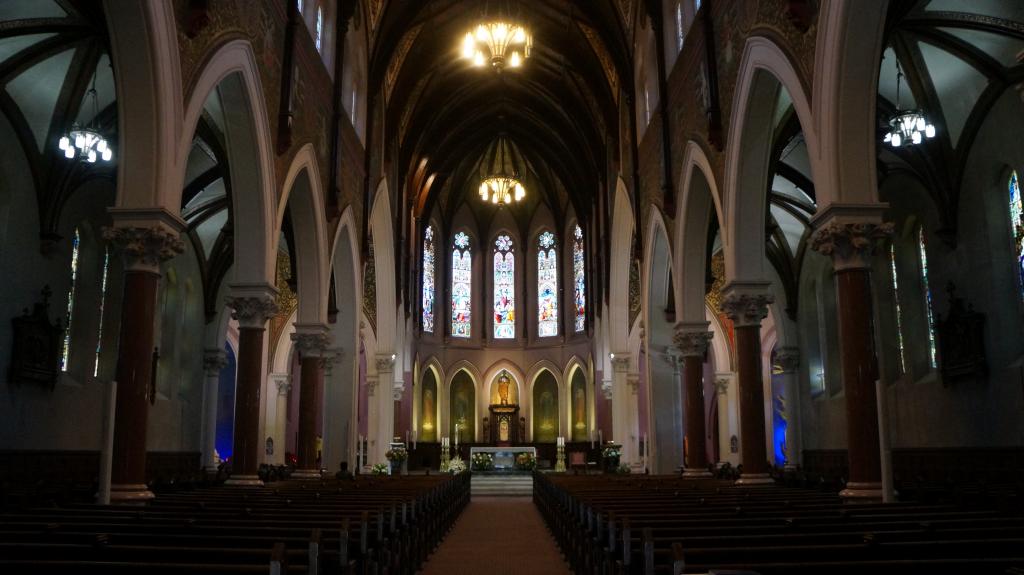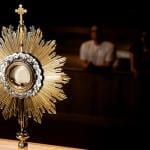
There’s an area in my city called Church Street where there are at least ten different church denominations within a span of five city blocks. What’s encouraging to know is all these denominations seem to work alongside each other in helping the homeless and at-risk individuals in the city’s downtown core. A willingness to work together to improve the quality of life of the marginalized and less fortunate is definitely a sign of a strong community. My impression is it seems these particular congregations on Church Street have a uniquely positive working relationship with each other.
Sadly, many different church denominations throughout the world are completely at odds with each other when it comes to doctrinal matters, despite claiming to worship the same God. Much of this stems from how these groups interpret the Bible, which can be traced back to movements in history such as the Protestant Reformation 1 and the Great Schism. 2 It would appear Christianity seems to have a crisis of unity among its followers.
But surely they must all share some things in common? In the Bible, there are two examples I can think of that seem to address this particular issue — the first being when St. John sees another man performing an exorcism without their approval,
“John answered, “Master, we saw a man casting out demons in your name, and we forbade him, because he does not follow with us.” But Jesus said to him, “Do not forbid him; for he that is not against you is for you.“ 3
The second passage being when St. Paul addresses the issue of disunity among members in the Church of Corinth,
“I appeal to you, brethren, by the name of our Lord Jesus Christ, that all of you agree and that there be no dissensions among you, but that you be united in the same mind and the same judgment. For it has been reported to me by Chlo′e’s people that there is quarreling among you, my brethren. What I mean is that each one of you says, “I belong to Paul,” or “I belong to Apol′los,” or “I belong to Cephas,” or “I belong to Christ.” Is Christ divided? Was Paul crucified for you? Or were you baptized in the name of Paul? For Christ did not send me to baptize but to preach the gospel, and not with eloquent wisdom, lest the cross of Christ be emptied of its power.” 4
Does it really matter what church any of us belong to, as long as we believe in Jesus? I would have to argue that it shouldn’t. After all, nobody chooses what part of the world or what culture to be born into. I have several Evangelical friends who have embarked on many missions trips around the world where Christians are persecuted as an underground minority. From my understanding, none of these uncontrollable factors should have any bearing on a person’s salvation; and if God is all-powerful, He should not be limited by sacraments or church membership. 5 Church-shopping and listening to conflicting opinions among my own Christian friends made me think about what the nature of truth really is. Over time, I began to struggle with the idea that as long as you believed in Jesus it didn’t matter what denomination you were from. But what about Mormons and Jehovah’s witnesses who deny the Trinity? They still believe in Jesus too, don’t they? I began to find a relativistic approach to whether all denominations were ‘right in their own way’ to be an insufficient explanation for the seemingly petty inconsistencies.
Or does it mean God’s grace doesn’t care about semantics?
As an Evangelical, I struggled with what seemed to me like a false dichotomy that there were two types of people in this world: those who were automatically saved through faith in Jesus and those who were not. What about Orthodox Jews? What about atheists who grew up in Christian homes who had been wounded by reckless actions committed by fellow congregates? What about Muslims who believe Jesus existed but was merely a prophet rather than God Himself? What about aboriginal tribes living in isolated corners of the world who have no idea who Jesus really is? The more I thought about these things, the more I found myself resenting the idea of a God who would create people predestined for eternal suffering simply for being unaware.
Surely, there must be elements of truth found in different religions though, right? One of the positive outcomes of the New Age movement is how it paved the way for religious tolerance in western society. But does this mean all religions are true?
On the other hand, maybe it’s possible we are judged based on where our hearts are at regardless of what part of the world we are from? 6 Maybe it’s possible that God judges us individually through means beyond our comprehension? It isn’t my place to determine where people’s hearts stand in God’s eyes. But that being said, I have no doubt there will be people in heaven who identified as Muslim, Mormon or having no religious affiliation whatsoever during their earthly lives.
It seems having faith in Jesus is about having a relationship with Him as opposed to going through the motions of systematic rituals. But if we are supposedly justified by faith, why is it so many Protestants believe Catholics are not real Christians, yet are willing to accept differing Protestants as their own brethren? Some arguments I’ve heard was that Catholics believe in a counterfeit Jesus and their theology is entirely works-based and recycled paganism, but much of these arguments are stemmed from hostile historical animosity.
One of the most controversial statements by the Catholic Church is the Latin phrase, “Extra Ecclesiam Nulla Salus,” which means, “There is one universal Church of the faithful, outside of which there is absolutely no salvation.“ 7 At first glance, this seems like a very bigoted and narrow-minded statement. How arrogant can any religious institution be to claim they are the only true one out there? Doesn’t every religion claim to have THE truth, or elements of truth we can all learn from?
On the other hand, this doesn’t seem any more offensive or ‘intolerant’ than the very words of Jesus when He says,
“I am the way, and the truth, and the life; no one comes to the Father, but by me.“ 8
From a non-Christian perspective, this is probably one of the most offensive verses because it implies there is only one way to Heaven. By today’s political standards, it can be viewed as intolerant or narrow-minded. In such a vast and culturally diverse world, who is anyone to think non-Christians wouldn’t go to Heaven when they die just because they either don’t believe Jesus is God, or haven’t been properly introduced to Christianity?
It is commonly repeated among American Evangelicals that Jesus is not a religion. But if Jesus came to abolish religion, then what did He mean when He said, “If you love me, keep my commandments?” 9 What did He mean when He said, “I have come not to abolish the law but to fulfill it?” 10 What did St. Paul mean when he said, “…stand firm and hold to the traditions which you were taught by us, either by word of mouth or by letter?” 11 The problem with wanting to abolish religion is it’s completely inconsistent with what the Bible teaches. To blame all wars and corruption on religion is to deny the human condition and personal responsibility due to Original Sin, like blaming a car accident on the vehicle rather than the driver who was at fault. In my opinion, the desire to abolish religion is akin to what motivated the Nazis to set up death camps for the Jews.
In my observation of history, I find it compelling how many church denominations split off and multiplied into several smaller ones. As some grew into flourishing faith-communities, others either died off or became indistinguishable from the secular world. Yet the ones that survived the test of time are the ones that seemed to have adhered to orthodoxy — which is quite reminiscent to the parable of the true vine. 12 I think if the Devil actually exists, one way he could be attempting to destroy the Church would be to split it into smaller groups that are easier to pick off and eliminate.
With that in mind, I can fully agree with the notion that denominations are completely unbiblical.
One major point I cannot stress enough is just because many non-Catholic Christians aren’t united under the Pope’s umbrella, it doesn’t make their faith and ministry invalid, nor does it mean these people are going to Hell. If what they believe reflects what is mentioned in the Apostles Creed and the Nicene Creed, who is anybody to say they are not Christians? The Catechism of the Catholic Church especially states regarding non-Catholic Christians,
“Justified by faith in Baptism, [they] are incorporated into Christ; they therefore have a right to be called Christians, and with good reason are accepted as brothers by the children of the Catholic Church. Baptism therefore constitutes the sacramental bond of unity existing among all who through it are reborn.” 13
A friend of mine once said that the Christian Church as a whole is like a giant stew — the combination of all the unique ingredients and spices are what make the flavor of the stew. In that sense, I believe Catholics and Protestants can most certainly learn from each other. Protestants generally have a tremendous amount of zeal for biblical literacy and evangelism that is certainly lacking in many Catholic laypeople, whereas Catholics strongly value unity and have a serious sense of reverence in their worship that Protestants can surely take note of. I am convinced God has been and will continue to use these combined qualities to enhance His Kingdom. We are united by virtue of faith and baptism.
Above: Fr. Mike Schmitz uses a metaphor to describe how the Church has journeyed through history.
One of the biggest reasons why I returned to Catholicism is my desire for Christian unity. Although it’s tough to boast about unity when Catholicism has its own internal issues of division, I long for the day Christ becomes unified with all believers and we can no longer segregate ourselves into ideological groups. The fact that Christianity survived nearly two thousand years of persecution, war, corruption, scandal and schism to this day is a testimony to me that there must be something truly divine protecting it from dying off — and the same can especially be said for Catholicism.
As for whether the Catholic Church is the ‘One True Church,’ I do not have a sufficient answer. This is a much more complex topic than I’m used to writing about. I am not a theologian, a historian nor a biblical scholar, but my personal convictions have led me to believe I need Jesus as a solid foundation to base my life upon. I need His Church because life is messy and, regardless of how much Scripture I can memorize, I honestly don’t know any better. 14
In summary, I believe in my heart of hearts the Catholic Church is truly founded by Christ Himself; and in the end, His fractured Body will reunite and denominations will cease to exist…. 15
…and just as I believe Jesus died and rose again for the forgiveness of sins, that is something I accept out of faith.
“I do not pray for these only, but also for those who believe in me through their world, that they may all be one; even as thou, Father, art in me, and I in thee, that they also may be in us, so that the world may believe that thou hast sent me.“
— John 17:20-21 RSV
References:
1 Wikipedia: https://en.wikipedia.org/wiki/Reformation
2 Wikipedia: https://en.wikipedia.org/wiki/East%E2%80%93West_Schism
3 Luke 9:49-50
4 Corinthians 1:10-13,17
5 CCC 1257
6 Romans 2
7 Fourth Lateran Council, Canon I; Catholic Answers: https://www.catholic.com/magazine/print-edition/what-no-salvation-outside-the-church-means
8 John 14:6
9 John 4:1-42
10 Matthew 5:17-20
11 2 Thessalonians 2:15
12 John 15:1-11
13 CCC 1271
14 Ephesians 2:20, Acts 8:30-31
15 Galatians 3:28












